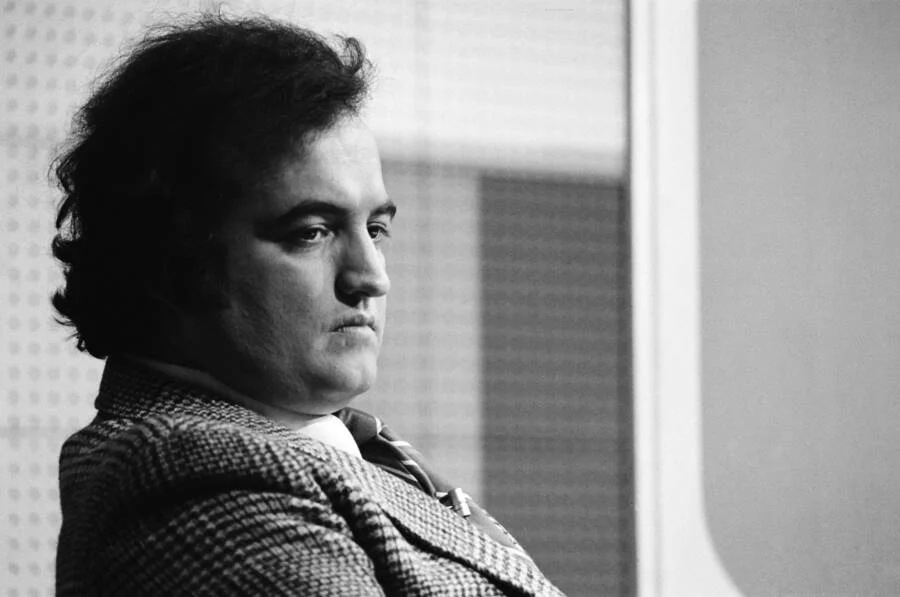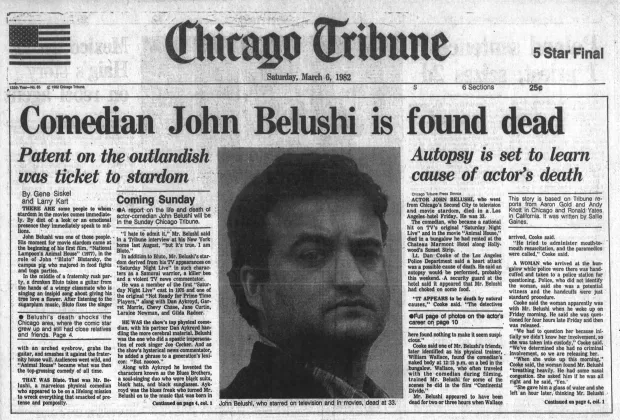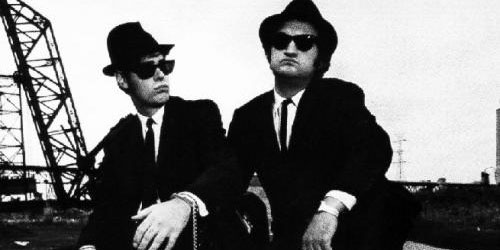I was the ideal demographic: alive while he thrived on Saturday Night Live, old enough to catch Animal House on cable, young enough to think The Blues Brothers were amazing (I still kinda do, see below), and smart enough to understand John Belushi was a generational talent, a force of nature, a genius. I still remember exactly where I was when the news came over the proverbial wire that JB had checked out, prematurely and predictably. Two years after John Lennon and four before Len Bias, these unwelcome reminders that the gods amongst us not only also have expiration dates, but on occasion the bill comes due a hell of a lot quicker than anyone would prefer.
Big thanks to The Daily Drunk for publishing this last year. This one will appear in my forthcoming collection Kinds of Blue (more on that, here).

John Belushi’s Bungalow*
There’s the L.A. we created and the one that creates us
where, after-hours when the paparazzi scurries back
to their holes (hive-minded parasites without whom,
admittedly, the Strip’s frisson would cease to function,
devils’ bargains made with angels’ blood), in alleys,
half-dead hobos give head for anything on offer as puffed
up producers slump in the back seats of chauffeured cars—
oblivious to who’s going down behind these sordid scenes.
*
On March Fourth, blowing off steam with some Bolivian
marching powder, John Belushi blew it, a speedball sent
from hell to usher him into anti-eternity, where our martyrs
perish so they’ll stay preserved in digital tombs, also known
as bodies of work—death by natural causes if one considers
the time and place, stuck inside the Chateau Marmont, itself
unable to contain his capacity or answer his appetites: only
stars die so indelibly, burned black by their own brightness.
*
Who would have bet against Belushi being the odd man out,
when Robert and Robin popped in, receiving and/or recoiling
from his hospitality, pizza boxes and filthy laundry scattered
like bounced checks? (Williams, sad clown sui generis, stayed
high on his own supply and sucked on that rare ether until
the air got too contaminated, hoisted at last on his own
affected petard; De Niro—part Bull, part Mafia Boss—able
to call his own shots, bearing the weight of his greatness.)
*
It’s as though the 20th C. couldn’t believe what it created,
our culture always emerging from wreckage of ruined lives,
the truth forever outstripping what any screenwriter could
concoct, keyed up with squalid material too real for TV;
the news a succession of coroner’s reports, confirming all
we already know: it’s intoxicating work if you can get it,
but those not built to last will have their souls devoured,
mourned at a safe distance by voyeurs cursed with long lives.
*
(*On the evening of March 4, 1982, John Belushi—after a short period of abstaining from hard drugs—was holed up in a bungalow at L.A.’s Chateau Marmont hotel, in the midst of a significant relapse; before being found dead of an overdose the following morning he was visited at various points of the evening by drug dealer Cathy Smith, comedian Robin Williams, and actor Robert De Niro.)
More on Joliet Jake and his “best role” via this piece from 2008.
How many people who would care to quibble that John Belushi’s endlessly quotable turn as “Bluto” Blutarsky does not represent his finest work? Not me. And yet, he had to be Blutarski; he needed to be Blutarski. He wasBlutarski. Just like he was the Samurai, The Thing That Wouldn’t Leave, and the cheeseburger-dispensing counter jockey at the Olympia Café, among many other unforgettable characters he embodied. Belushi was not a black man. And, in truth, he didn’t even play one on TV. He played a white man emulating a black man, first as a Bee, eventually as a brother—a Blues Brother. Enter “Joliet” Jake Blues who, along with Elwood, had the chutzpah, or brilliance—or both—to step behind the mic for real and record music.
Best known for the movie they made, a kitchen-sink comedy that, despite it’s shoehorned, yet incredible, cameos by the likes of Aretha Franklin, Ray Charles and John Lee Hooker, remains hilarious and retains a strong quote-quotient. Less known is the fact that, in addition to the movie soundtrack, they made two other albums. Impossible as it seems, the first one (1978’s Briefcase Full of Blues) went to the top of the charts, fueled by their cover of Sam and Dave’s “Soul Man”. So, 30 years later, how do we assess this brief body of work? First and foremost, the only thing that prevents it from being the most ill-fated, vainglorious and embarrassingly ego-driven debacle of all time is the simple fact that Belushi really meant it. He cared, and however he did it—ability or acting, or most likely, both—he pulled it off.
It only takes a cursory glance at the tracks the band covered to see where they were coming from: not a ton of obvious “hits” there, aside from the aforementioned “Soul Man” (which still was—and remains—a shockingly unpredictable success for mainstream radio during the height of the disco era!), and the rather pedestrian “Gimme Some Lovin’” (which, incidentally, is a rather pedestrian and pallid song in the first place). Of course, it also didn’t hurt that Belushi had the best working blues band in the world behind him, featuring Steve “The Colonel” Cropper and Donald “Duck” Dunn (of Booker T. & The MGs—the Stax band that played on some of the original tunes being covered). It was, in short, a dream band, and it would be a travesty of the highest order for Belushi—or anyone—to make a mockery (intentionally or not) of the proceedings. Fortunately, this possibility was avoided for one single, simple reason: it works.
(Sidenote: even if it hadn’t worked, it speaks volumes about Belushi’s character and his 33 1/3 street cred that he knew very well the caliber of men he was lucky enough to be associated with. Likewise, they were lucky too, since Joliet Jake bent over backward to give them ample time in the spotlight: this was a win/win in the sense that the paychecks couldn’t have hurt, and it was exposing the great music these men had made—and continued to make—to an entirely new audience. In the end, if the worst crime he committed was getting some generally unsung heroes some well-earned time in the sun, and turning some of the world on to some essential music, then Belushi acquitted himself quite nicely here.)
The first one was the best. While the movie soundtrack and Made in America are okay, Briefcase Full of Bluesremains an album that can be returned to often and with considerable satisfaction. Forget the movie, and SNL, and the outfits: on an album it’s just the voices and the music, with no shtick to save you. And to oblige the predictable protests of those most cynical purists, even if it is acknowledged that Belushi was, in effect, acting as a blues singer, it remains his most challenging, and convincing role. Or put in more realistic perspective, he is, obviously, acting, but it’s a role—and a world—he is more than casually acquainted with. After all: even white boys get the blues. Think Belushi didn’t know a thing or two about the blues? Think about the other super-sized SNL alum, the wealthy and much-loved Chris Farley. Think either of these men had those voracious appetites for destruction because they were unreservedly happy?
Consider the last song on side one, “Shotgun Blues”: even though this song is a showcase for Matt “Guitar” Murphy, it is a tour de force all around, from Steve Jordan’s explosive drums to Aykroyd—I mean Elwood’s surprisingly effective harmonica and especially the vocals (singing lyrics that are especially painful to hear considering Belushi’s not-too-distant death). In fact, if you pulled Belushi’s vocals and had the exact same track with Junior Wells (circa 1978, or 1958 for that matter) singing, it might come close to miraculous. And speaking of Junior, the band’s take on “Messin’ with the Kid” presumably inspired some folks to seek out the real deal. Again, that too would justify the entire endeavor. In the end, you can see it with your ears: Joliet Jake was, in more ways than one, the role of John Belushi’s life.


